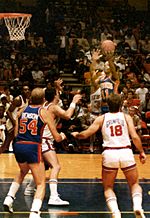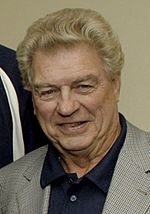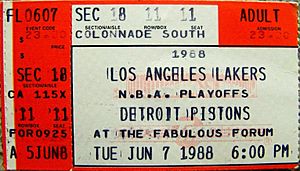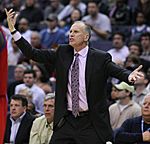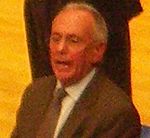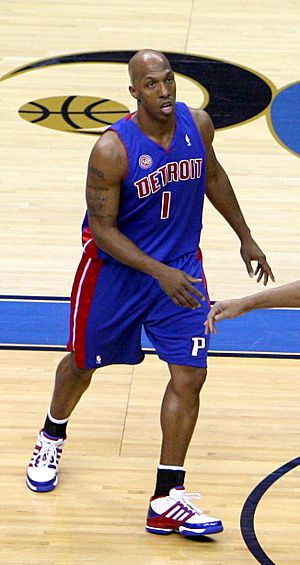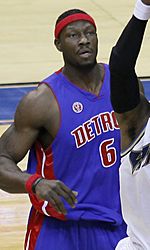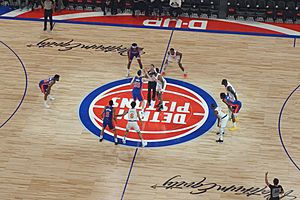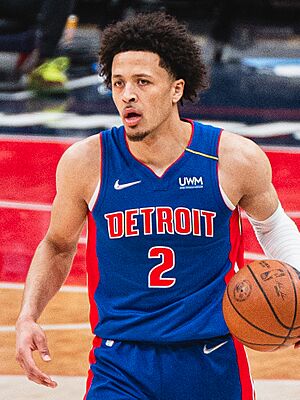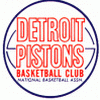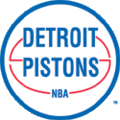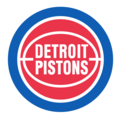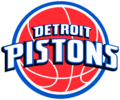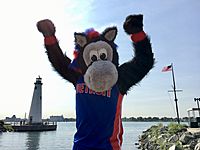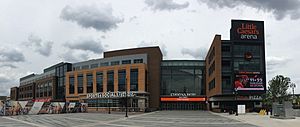Detroit Pistons facts for kids
Quick facts for kids Detroit Pistons |
|||
|---|---|---|---|
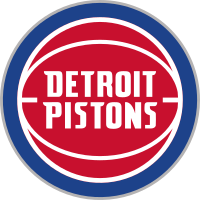 |
|||
| Conference | Eastern | ||
| Division | Central | ||
| Founded | 1937 | ||
| History | Fort Wayne Zollner Pistons 1937–1941 (semi-professional) 1941–1948 (NBL) Fort Wayne Pistons 1948–1957 (BAA/NBA) Detroit Pistons 1957–present |
||
| Arena | Little Caesars Arena | ||
| Capacity | 20,332 | ||
| Location | Detroit, Michigan | ||
| Team colors | Royal blue, red, chrome, black, white |
||
| Main sponsor | StockX | ||
| President | Trajan Langdon | ||
| General manager | Vacant | ||
| Head coach | J. B. Bickerstaff | ||
| Ownership | Tom Gores | ||
| Affiliation(s) | Motor City Cruise | ||
| Championships | 5 NBL: 2 (1944, 1945) NBA: 3 (1989, 1990, 2004) |
||
| Conference titles | 5 (1988, 1989, 1990, 2004, 2005) | ||
| Division titles | 15 NBL: 4 (1943, 1944, 1945, 1946) NBA: 11 (1955, 1956, 1988, 1989, 1990, 2002, 2003, 2005, 2006, 2007, 2008) |
||
| Retired numbers | 11 (1, 2, 3, 4, 10, 11, 15, 16, 21, 32, 40) | ||
|
|||
The Detroit Pistons are a professional basketball team based in Detroit, Michigan. They play in the National Basketball Association (NBA). The Pistons are part of the Eastern Conference and the Central Division. Their home games are played at Little Caesars Arena in Midtown Detroit.
The team started in 1937 as the Fort Wayne Zollner Pistons. They were a semi-professional team in Fort Wayne, Indiana. In 1941, they became a professional team in the National Basketball League (NBL). They won two NBL championships in 1944 and 1945. The Pistons joined the Basketball Association of America (BAA) in 1948. When the NBL and BAA merged to form the NBA in 1949, the Pistons became an NBA team. In 1957, the team moved to Detroit. The Pistons have won three NBA championships: in 1989, 1990, and 2004.
Contents
- Team History
- Early Years in Fort Wayne (1937–1957)
- Moving to Detroit and Early Struggles (1957–1981)
- The Isiah Thomas Era (1981–1994)
- The Grant Hill Era (1994–2000)
- The "Goin' to Work" Era (2000–2008)
- Rebuilding and Struggles (2008–2015)
- Return to the Playoffs (2015–2017)
- Moving Downtown (2017–2020)
- Recent Seasons and Turnaround (2020–Present)
- Team Identity
- Home Arenas
- Retired Numbers
- Basketball Hall of Fame Members
- Team Records and Awards
- Team Rivalries
- See also
Team History
Early Years in Fort Wayne (1937–1957)
Fred Zollner owned the Zollner Corporation, which made pistons for car engines. In 1937, he started a basketball team for his workers called the Fort Wayne Zollner Pistons. In 1941, the team joined the NBL. They won NBL championships in 1944 and 1945. They also won the World Professional Basketball Tournament three times.
In 1948, the team became the Fort Wayne Pistons and joined the Basketball Association of America (BAA). Fred Zollner helped create the NBA by merging the BAA and NBL in 1949.
There were some suggestions that Pistons players did not play their best in certain games during the 1953–54 and 1954–55 seasons. Some believe the team might have intentionally lost the 1955 NBA Finals to the Syracuse Nationals. In the final game, the Pistons had a big lead but lost. The Nationals won with a free throw in the last seconds. The Pistons also lost the 1956 NBA Finals to the Philadelphia Warriors.
Moving to Detroit and Early Struggles (1957–1981)
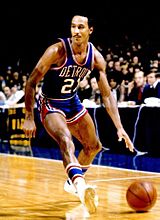
Fort Wayne was a small city, and it was hard for the team to make money. So, after the 1956–57 season, Fred Zollner moved the team to Detroit. Detroit was a big city and a center for the car industry. Zollner kept the "Pistons" name because it fit well with Detroit's car-making history. In their first season in Detroit, George Yardley set an NBA scoring record.
The Pistons played at Olympia Stadium for four seasons. Then they moved to Cobo Arena in 1961.
During the 1960s and 1970s, the Pistons had talented players like George Yardley, Bailey Howell, Dave Debusschere, Dave Bing, and Bob Lanier. However, the team often made questionable trades and changed coaches a lot. Many of these talented players were traded away, feeling frustrated with the team's direction.
In 1974, Zollner sold the team to Bill Davidson. He owned the team until he passed away in 2009.
The team had a winning season in 1971. They then made the playoffs for four straight seasons from 1974 to 1977. In 1978, Dick Vitale became the coach, but he was fired the next season. The team struggled, finishing with a 16–66 record in 1979–80. They also had a long losing streak.
Bill Davidson was not happy with Cobo Arena. In 1978, he moved the team to Pontiac. They played at the Pontiac Silverdome, a large stadium built for football.
The Isiah Thomas Era (1981–1994)
The team's luck began to change in 1981. They drafted point guard Isiah Thomas from Indiana University. In November 1981, they got Vinnie Johnson in a trade. They also acquired Bill Laimbeer in February 1982. A key step was hiring Chuck Daly as head coach in 1983.
At first, the Pistons struggled to climb the NBA ranks. In the 1984 playoffs, they lost a close series to the New York Knicks. In the 1985 playoffs, they faced the Boston Celtics. Even though Boston won, Detroit's strong performance showed a new rivalry was starting. In the 1985 NBA draft, they picked Joe Dumars, which was a great choice. They also traded for Rick Mahorn. However, they lost in the first round of the 1986 playoffs. After that, the team decided to focus more on defense.
The "Bad Boys" Era (1986–1992)
Before the 1986–87 season, the Pistons added more important players: John Salley, Dennis Rodman, and Adrian Dantley. The team became known for its tough, physical, and defense-focused style of play. This earned them the nickname "Bad Boys."
In 1987, the Pistons reached the Eastern Conference Finals against the Celtics. The series was tied 2–2. In Game 5, the Pistons were about to win. But Larry Bird stole an inbound pass and scored the winning basket. The Pistons won Game 6 but lost the series in a tough Game 7.
Motivated by their loss, the 1987–88 Pistons had a record 54 wins. They won their first division title in 32 years. In the playoffs, they beat the Celtics in six games. This sent them to the NBA Finals for the first time since moving to Detroit.
In the 1988 NBA Finals, the Pistons played against the Los Angeles Lakers. The Lakers had stars like Magic Johnson and Kareem Abdul-Jabbar. The Pistons led the series 3–2. In Game 6, Isiah Thomas scored an NBA Finals record 25 points in one quarter, even with a sprained ankle. But the Lakers won the game by one point. The Lakers won the series in Game 7, 108–105.
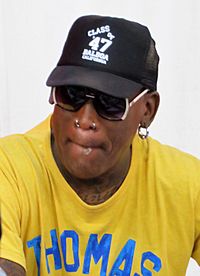
Before the 1988–89 season, the Pistons moved to Auburn Hills, Michigan. They played at The Palace of Auburn Hills, which was built with private money. The 1989 Pistons traded Adrian Dantley for Mark Aguirre. This trade helped them complete their team. They won 63 games, a new franchise record. They then swept the Lakers in the 1989 NBA Finals to win their first NBA championship. Joe Dumars was named the Finals MVP.
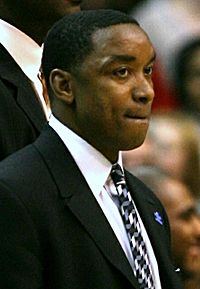
The Pistons won their second straight title in 1990. They won 59 games and another division title. In the Eastern Conference Finals, they faced Michael Jordan and the Chicago Bulls. The Pistons won a tough Game 7. In the 1990 NBA Finals, they played the Portland Trail Blazers. The Pistons won three games in Portland, which was a first for an NBA team. In the final game, Vinnie Johnson made a shot with 0.7 seconds left to win the game. Isiah Thomas was named NBA Finals MVP.
The Pistons' championship run ended in the 1991 Eastern Conference Finals. They were swept by the Chicago Bulls. Isiah Thomas had a wrist injury before these playoffs. After the final game, the Pistons walked off the court without shaking hands with the Bulls. This caused some controversy.
After being swept, the Pistons traded James Edwards and let Vinnie Johnson go. In the 1991–92 season, they finished with a 48–34 record. But they lost in the first round of the 1992 playoffs. Chuck Daly resigned as coach after the season. Many key players were traded or retired. The team had a very tough season in 1993–94, finishing with only 20 wins.
The Grant Hill Era (1994–2000)
After the 1993–94 season, the Pistons drafted Grant Hill, a promising player. However, the team made some poor decisions with players and changed coaches often. In 1996, the Pistons changed their team colors from red and blue to teal, burgundy, gold, and black. This was not popular with fans and became known as the "teal era."
The "Goin' to Work" Era (2000–2008)
Building a Championship Team (2000–2002)
After the 2000 playoffs, Joe Dumars became the team's president of basketball operations. Grant Hill left for the Orlando Magic. But Dumars made a trade that brought Ben Wallace and Chucky Atkins to the Pistons. Ben Wallace became a fantastic defensive player.
The Pistons had another tough season in 2000–01. After the season, they hired Rick Carlisle as head coach. The team also changed back to its traditional red, white, and blue colors.
Carlisle led the Pistons to their first 50-win season since 1997. They also won a playoff series for the first time since 1991. However, they lost to the Boston Celtics in the next round.
Six Straight Conference Finals (2003–2008)
In 2002, Joe Dumars added Chauncey Billups, Richard "Rip" Hamilton, and drafted Tayshaun Prince. The Pistons had two more 50-win seasons. They reached the 2003 Eastern Conference Finals but were swept by the New Jersey Nets.
Despite the team's improvement, Rick Carlisle was fired in 2003. Larry Brown was hired as the new coach.
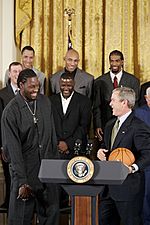
The Pistons became a championship team when they acquired Rasheed Wallace in February 2004. The 2003–04 Pistons finished with 54 wins. In the 2004 NBA playoffs, they beat the Milwaukee Bucks and then came back from a 3–2 deficit to defeat the New Jersey Nets. They then beat the Indiana Pacers to reach the 2004 NBA Finals. Many experts thought the Pistons had little chance against the Los Angeles Lakers, who had won three of the last four championships. But the Pistons won the series in five games, winning their third NBA championship. Chauncey Billups was named NBA Finals MVP.
In 2005, the Pistons were strong contenders for another title. They won 54 games. In the 2005 NBA playoffs, they beat the Philadelphia 76ers and the Indiana Pacers. In the Eastern Conference Finals, they faced the Miami Heat and won in seven games. In the 2005 NBA Finals, the Pistons played the San Antonio Spurs. The series was tied 2–2. In Game 5, the Spurs won in overtime with a last-second shot. The Pistons won Game 6, forcing a Game 7. But they lost a close game to the Spurs.
The 2004–05 season had a major incident known as the Malice at the Palace. This was a large altercation between players and fans. It led to many suspensions and fines. Coach Larry Brown also had health issues and was rumored to be looking for other jobs. The Pistons bought out his contract, and he joined the New York Knicks. The Pistons then hired Flip Saunders.
In the 2005–06 season, the Pistons had the best record in the NBA. They started 37–5, which was a record for any Detroit sports team. Four of their starters were named All-Stars. The Pistons finished with 64 wins, a new franchise record.
In the 2006 NBA playoffs, they beat the Milwaukee Bucks. But they struggled against the Cleveland Cavaliers, winning in seven games. In the Eastern Conference Finals, they lost to the Miami Heat in six games.
During the off-season, Ben Wallace left the Pistons for the Chicago Bulls. To replace him, the Pistons signed Nazr Mohammed. On January 16, 2007, they signed Chris Webber. The team played much better with Webber. They finished with the best record in the Eastern Conference.
The Pistons swept the Orlando Magic in the first round of the 2007 NBA playoffs. They then beat the Chicago Bulls to reach the Eastern Conference Finals for the fifth straight season. There, they faced the Cleveland Cavaliers. The series was tied 2–2. In Game 5, LeBron James scored 29 of his team's last 30 points to win in double overtime. The Pistons lost Game 6 and were eliminated.
In the 2007 NBA draft, the Pistons picked Rodney Stuckey and Arron Afflalo. They also re-signed Chauncey Billups. This season marked the team's 50th anniversary in Detroit.
In the 2007–08 season, Rasheed Wallace became the team's center. The Pistons finished with 59 wins, the second-best record in the league. In the 2008 NBA playoffs, they beat the Philadelphia 76ers in six games.
In the semifinals, the Pistons faced the Orlando Magic. They won the series 4–1, even with Chauncey Billups injured for some games.
Detroit reached the Eastern Conference Finals for the sixth straight season. They played against the Boston Celtics. They lost Game 1 but won Game 2 on the road. The Celtics then won Game 3. The Pistons won Game 4. In Game 5, they lost a close game. In Game 6, the Pistons lost 89–81, ending their season. After the loss, Rasheed Wallace said, "It's over, man," hinting at changes to the team. The Celtics went on to win the NBA Finals. On June 3, 2008, the Pistons announced that Flip Saunders would not return as coach.
Rebuilding and Struggles (2008–2015)
On June 10, 2008, the Pistons hired Michael Curry as their new coach. On November 3, 2008, the Pistons traded Chauncey Billups and Antonio McDyess to the Denver Nuggets for Allen Iverson. This trade was seen as the start of a rebuilding process.
The season had many challenges and injuries. The Pistons finished with a losing record for the first time in eight years. They made the playoffs but were swept by the Cleveland Cavaliers. On June 30, 2009, Curry was fired. Iverson left the team.
The Pistons signed Ben Gordon and Charlie Villanueva. They also re-signed Ben Wallace. However, the team continued to struggle. They finished with a 27–55 record in 2009–10, their worst since 1994. Another losing season in 2010–11 led to the firing of coach John Kuester.
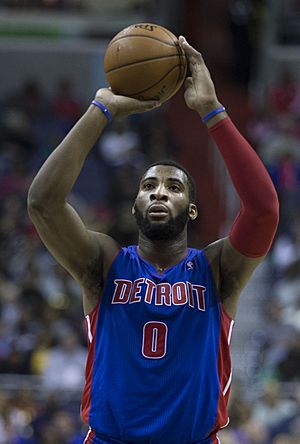
On April 7, 2011, Tom Gores bought the Pistons. The deal also included The Palace of Auburn Hills. The team hired Lawrence Frank as head coach. The 2011–12 season was a small improvement, but they still had a losing record. The team drafted talented center Andre Drummond.
After the 2012–13 season, Frank was fired. Maurice Cheeks was hired but lasted only half a season. John Loyer became interim coach. In April 2014, Joe Dumars stepped down as president. On May 14, 2014, Stan Van Gundy was hired as head coach and president.
The 2014–15 season started poorly. The Pistons waived Josh Smith. The team then went on a winning streak but finished with a 32–50 record after Brandon Jennings was injured.
Return to the Playoffs (2015–2017)
In the 2015 off-season, Stan Van Gundy changed the roster. He acquired players like Ersan İlyasova and Marcus Morris. They also drafted Stanley Johnson and re-signed Reggie Jackson. Andre Drummond started the 2015–16 season very strong.
The Pistons reached 42 wins in 2016, their first winning season since 2007–08. On April 8, 2016, they clinched a playoff spot for the first time since 2009. The Pistons faced the top-seeded Cleveland Cavaliers in the first round of the 2016 NBA playoffs. They were swept in four close games.
Moving Downtown (2017–2020)
Since 1978, the Pistons had played in suburban Oakland County. First at the Pontiac Silverdome, then at The Palace of Auburn Hills. Pistons owner Tom Gores began talks to move the team to the new Little Caesars Arena in downtown Detroit.
On November 22, 2016, the Pistons officially announced their plan to move. The Palace of Auburn Hills was to be redeveloped. The Pistons were the last NBA team to play in a suburb.
On June 20, 2017, Detroit City Council approved the move. On August 3, 2017, the NBA approved it. This made Detroit the only U.S. city with all its major sports teams playing downtown.
On January 29, 2018, the Pistons acquired All-Star forward Blake Griffin from the Los Angeles Clippers.
The Pistons finished the 2017–18 season with a 39–43 record, missing the playoffs. On May 7, 2018, Stan Van Gundy left his roles. On June 11, 2018, Dwane Casey was hired as the new head coach. The Pistons finished the 2018–19 season with a 41–41 record, making the playoffs as the eighth seed. In the first round, they were swept by the Milwaukee Bucks. This set an NBA record for the most consecutive playoff losses (14).
The 2019–20 NBA season was paused in March 2020 due to COVID-19. The season ended for the Pistons in June 2020. They finished with a 20–46 record.
Recent Seasons and Turnaround (2020–Present)
On June 18, 2020, the Pistons hired Troy Weaver as the new general manager. The Pistons finished the 2020–21 season with a 20–52 record, missing the playoffs again. In the 2021 NBA draft, the Pistons selected Cade Cunningham as the first overall pick. The 2021–22 season ended with a 23–59 record, missing the playoffs for a third straight season.
In the 2022 NBA draft, the Pistons selected Jaden Ivey and acquired Jalen Duren. The 2022–23 season ended with a 17–65 record, the worst in the NBA. Dwane Casey stepped down as head coach. On June 2, 2023, Monty Williams was hired as the new head coach.
The 2023–24 season started with a 2–1 record. However, the team then lost a franchise-record 28 games in a row. This was one of the longest losing streaks in NBA history. They finished with the worst record in the NBA for the second straight season, at 14–68.
On May 31, 2024, the Pistons hired Trajan Langdon as President of Basketball Operations. Troy Weaver stepped down as general manager. On June 19, 2024, Monty Williams was fired. On July 3, 2024, the Pistons hired J. B. Bickerstaff as head coach.
The 2024–25 season saw a big turnaround. On January 1, 2025, the Pistons surpassed their previous season's win total. On March 28, they secured their first winning season since 2016. On April 4, they clinched a playoff spot for the first time since 2019. The Pistons finished the 2024–25 season with a 44–38 record, their best since 2016. In the playoffs, they snapped their NBA-record 15-game postseason losing streak by beating the New York Knicks in Game 2. However, the Pistons were eventually defeated by the Knicks in six games.
Team Identity
Logos and Uniforms
After moving to Detroit in 1957, the Pistons' uniforms stayed mostly the same for 20 years. They had "Pistons" in blue block letters. In 1978–79, they used lightning bolts on the sides. The team went back to classic block letters in 1981. In 1996, the Pistons changed their colors to teal, black, yellow, and red. They also got a new logo with a horse's head and flaming mane. This "teal era" lasted until 2001. Then, the team returned to red, white, and blue. The horse logo was used until 2005, when they switched to a more classic logo.
On May 16, 2017, the Pistons revealed a new logo. It is a modern version of the "Bad Boys" era logo from 1979 to 1996.
Team Mascot: Hooper
Hooper is the official mascot of the Pistons. He is a horse wearing a Pistons jersey. The horse represents "horsepower," linking to the team's name, Pistons. Hooper joined the team on November 1, 1996.
Hooper was introduced during the "teal era" when the team had a horse logo. Even though the horse theme was phased out in 2005, Hooper remained popular and is still the team's mascot.
The "Bad Boys" Nickname
The "Bad Boys" nickname became popular during the 1987–88 season. The team played a very physical and tough style of basketball. Al Davis, owner of the Los Angeles Raiders, even sent Raiders gear to the Pistons. He recognized their similar tough approach.
The NBA's end-of-season video yearbook for the team was titled Bad Boys. The players and fans embraced the name. Pistons guard Joe Dumars said, "You can't be great in this league and have zero identity."
Not everyone liked the "Bad Boys" style. Michael Jordan famously said, "I hated them. And that hate carries even to this day." He felt their play was "dirty." However, many people in Detroit loved the team's "don't-back-down-ever" attitude. Pistons announcer George Blaha said it fit Detroit's working-class spirit.
Home Arenas
- North Side High School Gym (1948–1952)
- Allen County War Memorial Coliseum (1952–1957)
- Olympia Stadium (1957–1961)
- Memorial Building (University of Detroit) (1957–1961; used as an alternate)
- Cobo Arena (1961–1978)
- Pontiac Silverdome (1978–1988)
- The Palace of Auburn Hills (1988–2017)
- Little Caesars Arena (2017–present)
Retired Numbers
The Pistons honor special players and coaches by retiring their jersey numbers. This means no other player on the team can wear that number.
| Detroit Pistons Retired Numbers and Honorees | |||||
| No. | Player | Position | Tenure | Date | |
|---|---|---|---|---|---|
| 1 | Chauncey Billups | G | 2002–2008 2013–2014 |
February 10, 2016 | |
| 2 | Chuck Daly | Head coach | 1983–1992 | January 25, 1997 | |
| 3 | Ben Wallace | C | 2000–2006 2009–2012 |
January 16, 2016 | |
| 4 | Joe Dumars | G | 1985–1999 | March 10, 2000 | |
| 10 | Dennis Rodman | F | 1986–1993 | April 1, 2011 | |
| 11 | Isiah Thomas | G | 1981–1994 | February 17, 1996 | |
| 15 | Vinnie Johnson | G | 1981–1991 | February 5, 1994 | |
| 16 | Bob Lanier | C | 1970–1980 | January 9, 1993 | |
| 21 | Dave Bing | G | 1966–1975 | March 18, 1983 | |
| 32 | Richard Hamilton | G/F | 2002–2011 | February 26, 2017 | |
| 40 | Bill Laimbeer | C | 1982–1993 | February 4, 1995 | |
| — | Bill Davidson | Team owner | 1974–2009 | December 28, 2011 | |
| — | Jack McCloskey | General manager | 1979–1992 | March 29, 2008 | |
- The NBA retired Bill Russell's No. 6 for all its teams on August 11, 2022.
Basketball Hall of Fame Members
Many former Pistons players and coaches have been inducted into the Naismith Memorial Basketball Hall of Fame.
| Detroit Pistons Hall of Famers | |||||||||
| Players | |||||||||
| No. | Name | Position | Tenure | Inducted | No. | Name | Position | Tenure | Inducted |
|---|---|---|---|---|---|---|---|---|---|
| 14 | Andy Phillip | G/F | 1952–1956 | 1961 | 22 | Dave DeBusschere | F | 1962–1968 | 1983 |
| 17 | Bob Houbregs | C/F | 1954–1958 | 1987 | 20 | Bobby McDermott | G | 1941–1946 | 1988 |
| 21 | Dave Bing | G | 1966–1975 | 1990 | 11 | Harry Gallatin | F/C | 1957–1958 | 1991 |
| 16 | Bob Lanier | C | 1970–1980 | 1992 | 8 | Walt Bellamy | 1968–1970 | 1993 | |
| 15 | Dick McGuire | G | 1957–1960 | 1993 | 26 | Buddy Jeannette | G | 1943–1946 | 1994 |
| 12 | George Yardley | F/G | 1953–1959 | 1996 | 18 | Bailey Howell | F | 1959–1964 | 1997 |
| 11 | Bob McAdoo | F/C | 1979–1981 | 2000 | 11 | Isiah Thomas | G | 1981–1994 | 2000 |
| 4 | Joe Dumars | G | 1985–1999 | 2006 | 45 | Adrian Dantley | F | 1986–1989 | 2008 |
| 10 | Dennis Rodman | F | 1986–1993 | 2011 | 24 | Nathaniel Clifton | C/F | 1956–1957 | 2014 |
| 1 | Allen Iverson | G | 2008–2009 | 2016 | 1 | Tracy McGrady | G/F | 2010–2011 | 2017 |
| 33 | Grant Hill | F | 1994–2000 | 2018 | 6 | Chuck Cooper | F/G | 1956 | 2019 |
| 3 6 |
Ben Wallace | C | 2000–2006 2009–2012 |
2021 | 84 | Chris Webber | F | 2007 | 2021 |
| 1 | Chauncey Billups | G | 2002–2008 2013–2014 |
2024 | |||||
| Coaches | |||||||||
| Name | Position | Tenure | Inducted | Name | Position | Tenure | Inducted | ||
| 2 | Chuck Daly | Head coach | 1983–1992 | 1994 | Larry Brown | Head coach | 2003–2005 | 2002 | |
| Contributors | |||||||||
| Name | Position | Tenure | Inducted | Name | Position | Tenure | Inducted | ||
| Fred Zollner | Founder/Owner | 1937–1974 | 1999 | 17 | Earl Lloyd | F | 1958–1960 | 2003 | |
| Bill Davidson | Owner | 1974–2009 | 2008 | Dick Vitale | Head coach | 1978–1979 | 2008 | ||
| 10 | Rod Thorn | G | 1964–1965 | 2018 | Doug Collins | Head coach | 1995–1998 | 2024 | |
Team Records and Awards
Franchise Leaders (Regular Season)
These are the top players in different statistical categories for the Pistons. Bold means the player is still active with the team. Italic means the player is still active but not with the team.
Points Scored
- Isiah Thomas (18,822)
- Joe Dumars (16,401)
- Bob Lanier (15,488)
- Dave Bing (15,235)
- Bill Laimbeer (12,665)
- Richard Hamilton (11,582)
- Vinnie Johnson (10,146)
- Tayshaun Prince (10,006)
- Grant Hill (9,393)
- John Long (9,023)
- Andre Drummond (8,531)
- Bailey Howell (8,182)
- Gene Shue (8,034)
- Chauncey Billups (7,940)
- Kelly Tripucka (7,597)
- Jerry Stackhouse (7,451)
- Eddie Miles (7,419)
- George Yardley (7,339)
- Larry Foust (7,124)
- Dave DeBusschere (7,096)
Other Key Statistics
| Most Minutes Played | |
|---|---|
| Player | Minutes |
| Isiah Thomas | 35,516 |
| Joe Dumars | 35,139 |
| Bill Laimbeer | 30,602 |
| Tayshaun Prince | 26,166 |
| Dave Bing | 26,052 |
| Bob Lanier | 24,640 |
| Richard Hamilton | 21,679 |
| Ben Wallace | 21,358 |
| Vinnie Johnson | 20,218 |
| Lindsey Hunter | 18,574 |
| Most Rebounds | |
|---|---|
| Player | Rebounds |
| Bill Laimbeer | 9,430 |
| Andre Drummond | 8,199 |
| Bob Lanier | 8,063 |
| Ben Wallace | 7,264 |
| Dennis Rodman | 6,299 |
| Larry Foust | 5,200 |
| Walter Dukes | 4,986 |
| Dave DeBusschere | 4,947 |
| Bailey Howell | 4,583 |
| Ray Scott | 4,508 |
| Most Assists | |
|---|---|
| Player | Assists |
| Isiah Thomas | 9,061 |
| Joe Dumars | 4,612 |
| Dave Bing | 4,330 |
| Chauncey Billups | 2,984 |
| Grant Hill | 2,720 |
| Vinnie Johnson | 2,661 |
| Richard Hamilton | 2,419 |
| Bob Lanier | 2,256 |
| Tayshaun Prince | 2,074 |
| Lindsey Hunter | 2,038 |
| Most Steals | |
|---|---|
| Player | Steals |
| Isiah Thomas | 1,861 |
| Ben Wallace | 931 |
| Joe Dumars | 902 |
| Lindsey Hunter | 896 |
| Andre Drummond | 823 |
| Chris Ford | 785 |
| Vinnie Johnson | 708 |
| Grant Hill | 694 |
| John Long | 649 |
| Bill Laimbeer | 632 |
| Most Blocks | |
|---|---|
| Player | Blocks |
| Ben Wallace | 1,486 |
| Terry Tyler | 1,070 |
| Andre Drummond | 927 |
| Bob Lanier | 859 |
| Bill Laimbeer | 857 |
| John Salley | 709 |
| Rasheed Wallace | 623 |
| Tayshaun Prince | 448 |
| Jason Maxiell | 426 |
| Dennis Rodman | 399 |
| Most Three-Pointers Made | |
|---|---|
| Player | 3-pointers made |
| Joe Dumars | 990 |
| Chauncey Billups | 890 |
| Lindsey Hunter | 793 |
| Rasheed Wallace | 581 |
| Tayshaun Prince | 510 |
| Terry Mills | 495 |
| Saddiq Bey | 487 |
| Kentavious Caldwell-Pope | 479 |
| Reggie Jackson | 469 |
| Richard Hamilton | 413 |
Individual Awards
Many Pistons players and coaches have won important NBA awards.
- Joe Dumars – 1989
- Isiah Thomas – 1990
- Chauncey Billups – 2004
NBA Defensive Player of the Year
- Dennis Rodman – 1990, 1991
- Ben Wallace – 2002, 2003, 2005, 2006
NBA Rookie of the Year
- Don Meineke – 1953
- Dave Bing – 1967
- Grant Hill – 1995
NBA Sixth Man of the Year
- Corliss Williamson – 2002
NBA Coach of the Year
- Ray Scott – 1974
- Rick Carlisle – 2002
NBA Executive of the Year
- Joe Dumars – 2003
NBA Sportsmanship Award
- Joe Dumars – 1996
J. Walter Kennedy Citizenship Award
- Bob Lanier – 1978
- Kent Benson – 1982
- Isiah Thomas – 1987
- Joe Dumars – 1994
- Chauncey Billups – 2008
All-NBA First Team
- Larry Foust – 1955
- George Yardley – 1958
- Gene Shue – 1960
- Dave Bing – 1968, 1971
- Isiah Thomas – 1984–1986
- Grant Hill – 1997
All-NBA Second Team
- Fred Schaus – 1950
- Larry Foust – 1952
- George Yardley – 1957
- Gene Shue – 1961
- Bailey Howell – 1963
- Dave DeBusschere – 1969
- Dave Bing – 1974
- Isiah Thomas – 1983, 1987
- Joe Dumars – 1993
- Grant Hill – 1996, 1998–2000
- Ben Wallace – 2003, 2004, 2006
- Chauncey Billups – 2006
All-NBA Third Team
- Joe Dumars – 1990, 1991
- Dennis Rodman – 1992
- Ben Wallace – 2002, 2005
- Chauncey Billups – 2007
- Andre Drummond – 2016
- Blake Griffin – 2019
- Cade Cunningham – 2025
NBA All-Defensive First Team
- Joe Dumars – 1989, 1990, 1992, 1993
- Dennis Rodman – 1989–1993
- Ben Wallace – 2002–2006
NBA All-Defensive Second Team
- M. L. Carr – 1979
- Joe Dumars – 1991
- Clifford Robinson – 2002
- Chauncey Billups – 2005, 2006
- Tayshaun Prince – 2005–2008
NBA All-Rookie First Team
- Dave DeBusschere – 1963
- Joe Caldwell – 1965
- Tom Van Arsdale – 1966
- Dave Bing – 1967
- Bob Lanier – 1971
- Terry Tyler – 1979
- Isiah Thomas – 1982
- Kelly Tripucka – 1982
- Joe Dumars – 1986
- Grant Hill – 1995
- Brandon Knight – 2012
- Saddiq Bey – 2021
- Cade Cunningham – 2022
NBA All-Rookie Second Team
- Lindsey Hunter – 1994
- Željko Rebrača – 2002
- Rodney Stuckey – 2008
- Jonas Jerebko – 2010
- Greg Monroe – 2011
- Andre Drummond – 2013
- Kyle Singler – 2013
- Isaiah Stewart – 2021
- Jalen Duren – 2023
- Jaden Ivey – 2023
NBA All-Star Weekend Honors
NBA Eastern All-Star Game Head Coach
- Chuck Daly – 1990
- Doug Collins – 1997
- Flip Saunders – 2006
NBA All-Star Game MVP
- Bob Lanier – 1974
- Isiah Thomas – 1984, 1986
Team Rivalries
Chicago Bulls
The Pistons and the Chicago Bulls had a fierce rivalry, especially in the late 1980s and early 1990s. They often met in the playoffs. The Pistons' "Bad Boys" teams frequently battled Michael Jordan's Bulls.
Boston Celtics
The Boston Celtics were another major rival for the Pistons. Their playoff matchups in the 1980s were very intense and memorable.
Los Angeles Lakers
The Pistons and Los Angeles Lakers faced each other in the NBA Finals multiple times. These series were often exciting and highly anticipated.
See also
 In Spanish: Detroit Pistons para niños
In Spanish: Detroit Pistons para niños
 | Delilah Pierce |
 | Gordon Parks |
 | Augusta Savage |
 | Charles Ethan Porter |


